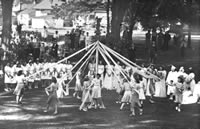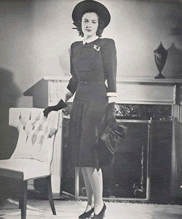
<<
Back
After
50 years of coeducation at DePauw, women students by and large still
found themselves in separate-some might say subordinate-campus roles
at the close of World War I. Excluded from membership, for example,
in the all-male journalism honorary Sigma Delta Chi, coeds interested
and active in journalism organized their own similar society, Theta
Sigma Phi, in 1919. Sigma Delta Chi's arch-rival, the advertising
honorary, Alpha Delta Sigma, also did not admit women. Though women
were playing a larger part in staffing student
publications, men continued for a long time to monopolize most
of the chief editorial positions. In partial recompense, the members
of Theta Sigma Phi published a special edition of the DePauw with
an all-female staff on Old Gold Day and May Day. Not. until 1939
did a coed become editor-in-chief of the DePauw, with the election
of Betty Parker to that post for the second semester of the academic
year.


Women were making progress in reaching top posts in other student
publications. Mary Niblack won the position of chief editor
of the Mirage as early as 1930, and Elizabeth Your headed the editorial
staff of the DePauw Magazine in the spring of 1937 and Virginia
Bridge that of the Boulder in the fall of 1942.
But separate campus organizations for women persisted throughout
this period. Ineligible for participation in the R.O.T.C. and its
honorary society, Scabbard and Blade, a group of coeds formed a
military auxiliary, Alpha Mu Phi in 1924. There were also a women's
rifle club and even a women's debate team which took part in intercollegiate
competition separately from the men. DePauw actually boasted a chapter
of the women's scholastic and leadership honorary, Mortar Board,
a decade before the formation of the all-male Blue Key in 1929.
With Old Gold Day in its early years chiefly oriented toward male
participation in class scraps and interclass football games, May
Day became the premier campus event for women. Held in early May
the festivities usually began with a lantern parade on Friday evening-sometimes
complemented by an unofficial "pajama parade" of male
students to the women's dormitories after hours. The next day the
Y.W.C.A. served an early morning breakfast on the East College lawn,
which was followed by a women's tennis tournament or field day and
a student-written and directed pageant. (In 1920 Margaret Mead,
later the distinguished anthropologist, wrote the day's pageant,
entitled "The Choice of American Girlhood.") The climactic
events took place in the Dells behind Longden Hall, where gaily
dressed coeds danced and sang, the seniors winding the May-pole,
juniors forming a daisy chain, and the Queen of the May accepting
her crown in the midst of her court. A play performed first in Meharry
Hall and later in the theatre
in Speech Hall concluded the day's events. Sometime in the 1930s
May Day was combined with Mothers' Day and survived in that form
down to recent times.

As at other coeducational colleges of the era where campus romances
often led to the altar after graduation, DePauw women were judged
in part by their femininity and desirability as marriage partners.
Beginning in 1923 the college yearbook, the Mirage, annually featured
a special section on "campus beauties," consisting of
a half dozen photographs of glamorously posed coeds selected by
vote of the male student body or by a well-known artist or other
supposed expert on female beauty and charm. In 1931 the celebrated
Broadway producer Florenz Ziegfield was called upon to make the
final selection.
Coeds themselves collaborated by nominating candidates from their
respective living units to participate in this competition. Despite
attempts from time to time by reform-minded editors to modify this
custom by instead presenting photographs of both men and women chosen
as "representative students," the emphasis on feminine
beauty and glamor continued to be a regular feature of the yearbooks
as late as the mid-1960s.
The practice of naming selected coeds to reign over campus festivities
proliferated in the 1930s and beyond. Besides the May Day Queen,
there were soon the Old Gold Day Queen, crowned at halftime during
the homecoming football game, the Dads' Day Queen in November, and
the various Prom Queens chosen to lead the grand march with their
male escorts.
A sign of coming changes in the perception of women's role on the
DePauw campus could perhaps be seen in the awarding of the coveted
Walker Cup in May 1941 to Rosa Neil Reynolds, the first coed to
achieve that honor.

________________________________________________
A group
of coeds in 1926 who formed a military auxiliary.
________________________________________________
Back
to Top
<<
Back
|






